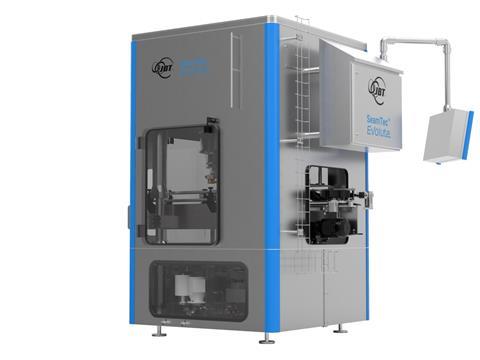
JBT Corporation has launched its SeamTec 2 Evolute technology for infant formula powders, aiming to meet powder market demands and efficiency.
The corporation states the technology has a hygienic design and cleanability while retaining the high-performing core features for powder such as spill reduction, packaging size flexibility, and explosion-proof technology.
Reportedly, the SeamTec 2 Evolute has redesigned elements aiming to optimize production. The powder seamer has a large window for maximized visibility and the reduction of the technology’s footprint allows for improved layout optimization and cost reduction.
The company says the key features of the technology include its open design, which reduces the amount of lubricant for operations and reduces contamination risks during production; the infeed scroll till seaming table; the stopping lifter; and the “highest amount of seaming heads possible within the market” for decreased rotational speed.
It also outlines the option of configurations for each high-speed powder application and low change-over possibilities for a 3, 4, and 6-head and combi 4, combi 6, and triple 6. It adds that all are possible for POE or DDE cans, with the possibility for changeover.
“The evolving requirements within the industry in terms of hygienic design, ease of use and economical constraints created the need for a redesign which resulted in the SeamTec 2 Evolute for Powder,” said Ronald Annendijck, JBT’s global product line manager filling & closing.
“The production of safe, high-quality infant formula is critical, and JBT continues to exceed expectations in the development of the safest, most hygienic technology available to processors today,” added Amedeo Scapin, global director product lines, diversified food and health.
Last year, Ella’s Kitchen launched its first mono-material pouch, which is apparently compatible with the UK recycling system – aiming to ensure 73% of its baby food pouches will be fully recyclable at kerbside by the end of 2024. The company is planning to repackage its entire pasteurised range to improve the recyclability of its packaging by removing additional aluminium.
In other news, BioPowder converted olive stone powders into additives for a range of packaging solutions, from solid containers and transparent films to biobased adhesives and barrier coatings – claiming to offer a versatile, low-carbon alternative to conventional raw materials.
If you liked this story, you might also enjoy:
The Brief: How viable is biorecycling for plastics?
Report: How the top brands are progressing on packaging sustainability
The Brief: Using ocean-bound plastic in packaging – how, why and should we?














No comments yet